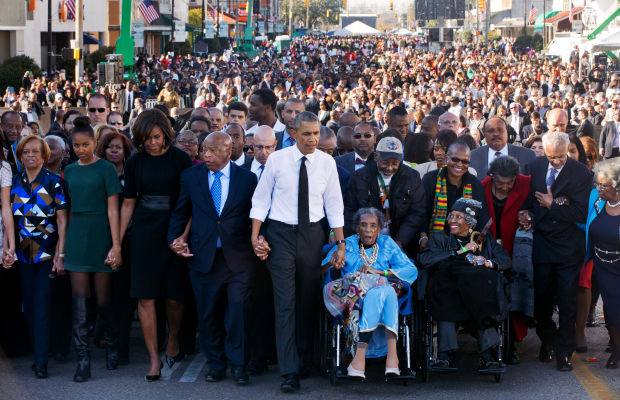

The President’s Weekly Address post is also an Open News Thread. Feel free to share other news stories in the comments.
From the White House – Weekly Address
In this week’s address, retired Federal Judge Timothy Lewis joined Vice President Joe Biden to discuss the nomination of Chief Judge Merrick Garland to the Supreme Court of the United States. The Vice President talked about his experience as the chairman of the Senate Judiciary Committee, during which every nominee got a hearing and an up or down vote on the Senate floor. Despite having more federal judicial experience than any other Supreme Court nominee in history, Chief Judge Garland’s nomination has now been pending longer than any other Supreme Court nominee who wasn’t withdrawn from consideration. Judge Lewis emphasized that this lack of action is preventing the Supreme Court from fulfilling its duty of interpreting the law and resolving conflicts in the lower courts. The Vice President made clear that for the sake of our Nation, everyone must do their job. That’s why the President did his job by nominating Chief Judge Merrick Garland. Now, it’s time for the Senate Republicans to do their job.
Transcript: Weekly Address: It’s Time to Fill the Vacancy on the Supreme Court
Remarks of Vice President Joe Biden and Retired Federal Judge Timothy Lewis as Prepared for Delivery
Weekly Address, The White House, July 30, 2016THE VICE PRESIDENT: Hi, folks. Joe Biden here and I’m sitting with Tim Lewis, a retired federal judge who was nominated to the bench by a Republican President and confirmed by a Democratic Senate—within four weeks of a presidential election.
JUDGE LEWIS: Hello, everyone. That’s right. And I’m living proof that President Obama’s nominee to the Supreme Court—Chief Judge Merrick Garland—deserves similar consideration by today’s Senate.
THE VICE PRESIDENT: Not only because Merrick Garland is recognized—without exception—by the right and the left as one of America’s sharpest legal minds and a model of integrity.
JUDGE LEWIS: But also because that’s what the Constitution requires. The sitting President shall—not may—but shall nominate someone to fill a vacancy on the Supreme Court, with the advice and consent of the Senate. That includes consulting and voting.
THE VICE PRESIDENT: Here’s how it works. For 17 years, I was chairman or ranking member of Senate Judiciary Committee, which overseas nominations to the Court. I presided over nine total nominations—more than anyone alive. Some I supported. Others I didn’t. But every nominee was greeted by committee members. Every nominee got a committee hearing. Every nominee got out of the committee to the Senate floor, even when a nominee did not receive majority support in my committee. And every nominee, including Justice Kennedy—in an election year—got an up or down vote by the Senate. Not much of the time. Not most of the time. Every single time. That’s the Constitution’s clear rule of Advice and Consent. And that’s the rule being violated today by Senate Republicans.
Nobody is suggesting that Senators have to vote “yes” on a nominee. Voting “no” is always an option. But saying nothing, seeing nothing, reading nothing, hearing nothing, and deciding in advance simply to turn your backs—is not an option the Constitution leaves open.
JUDGE LEWIS: And it has real consequences for all of us. In the four months since Merrick Garland’s nomination, we’ve already seen how the Senate’s refusal to act is preventing the Court from fulfilling its duty of interpreting what the law is and resolving conflicts in lower courts. Historic obstruction is leading to greater litigation costs and delays—the burden falling mostly on average Americans rather than corporations with endless resources. Unresolved decisions by the Supreme Court are leading to federal laws that should apply to the whole country being constitutional in some parts but unconstitutional in others. If this continues, our freedom of speech, our freedom to practice our faith, our right to vote, our right to privacy—all could depend on where we happen to live.
THE VICE PRESIDENT: And the longer the vacancy remains unfilled, the more serious the problem—with greater confusion and uncertainty about our safety and security. If you have eight Justices on a case, Justice Scalia himself wrote, that it raises the, “possibility that, by reason of a tie vote, the Court will find itself unable to resolve the significant legal issue presented by the case.” And if Republican Senators fail to act, it could be an entire year before a fully staffed Supreme Court can resolve any significant issue before it.
Folks, there’s enough dysfunction in Washington, D.C. Now is not the time for it to spread to the Supreme Court.
JUDGE LEWIS: And we’re better than what we’re seeing. As a country, we’re only as strong as the traditions we value—that we sustain by dedicating ourselves to something bigger than ourselves.
THE VICE PRESIDENT: Folks, the defining difference of our great democracy has always been that we can reason our way through to what ails us and then act as citizens, voters, and public servants to fix it. But we have to act in good faith. For unless we find common ground, we cannot govern. For the sake of the country we love—we all have to do our job. The President has done his. Senate Republicans must do theirs.
Thanks for listening and have a great weekend.
Bolding added.
~

Yesterday the president signed laws naming Post Offices, the only legislation the Do Nothing 114th Congress can agree upon.
Included in the list was this:
Amelia Boynton Robinson died last year. Here is more on her life:
Here she is with President Obama, commemorating the 50th Anniversary of Bloody Sunday:

A wonderful tribute to a lifelong activist for justice and civil rights.
Alabama Rep. Terri Sewell was instrumental in getting H.R. 4777 passed:

In the News: A convention speech recap by Lawrence O’Donnell (MSNBC) included an interview with the Khans, parents of a fallen soldier, who spoke at the convention:
Mr. Khan delivered his speech from memory, a speech written from his heart and delivered with such dignity and passion that it will be seared into our memories. He is also a Republican, disheartened at being abandoned by his party which is led by men who have placed party over country and endorsed Donald Trump and his hateful rhetoric.
After the segment calling out the GOP, the Khans spoke with about their son in an extended interview: Capt. Khan’s parents remember their son
The convention speech:
Donald Trump attacked the Gold Star parents on an ABC program Saturday.
But Khizr Khan is not done with Trump:
Sociopath. James Fallows reminds us of the Joseph Welch moment from the McCarthy hearings: “Until this moment, I think I never really gauged your cruelty.”
In the News: Former Attorney General Eric Holder on Trump’s Brain …
In the News: Voting Rights winning in the courts …
Two Tweets that tell the tale of our post-Shelby “post-racial” America announced by rich white guy Chief Justice John Roberts:
Charlie Pierce:
WaPo: The ‘smoking gun’ proving North Carolina Republicans tried to disenfranchise black voters
That bears repeating – “the State’s concern that African Americans had too much access to the franchise”.
Hillary Clinton and Tim Kaine campaigning in Johnstown PA. Tim Kaine dings The Donald for his lack of knowledge about “50 states”.
USA Today: Clinton to white, working-class voters: I’ll ‘fight’ for you